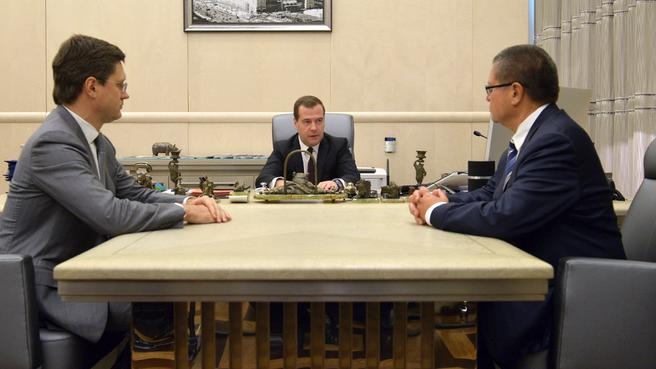Economic relations with Ukraine.
Transcript:
Dmitry Medvedev: Here is what I like to discuss with you as the ministers responsible for economic and energy policy regarding Ukraine. Let’s start with general issues. Not long ago I signed a resolution on introducing duties on Ukrainian goods if the country starts legal or practical implementation of the economic part of its free trade area agreement with the European Union. According to the Government resolution, if we receive information to this effect, we’ll introduce most-favoured-nation treatment with regard to Ukraine within ten days. This means that we’ll cancel benefits and introduce a number of duties.
So Mr Ulyukayev, I’d like to ask you, as the Minister of Economic Development, whether we have any information about legal or practical implementation of this agreement.
Alexei Ulyukayev: Mr Medvedev, to begin with, in accordance with our agreement, our European colleagues – the EU Commission – adopted a document on postponement of the temporary application of the relevant provision until 31 December 2015. This is fully in line with our agreements.
Second, in accordance with the Government directive, we have established a working group on monitoring the situation in Ukraine in order to determine whether this temporary measure is being applied overly or covertly. Now we are developing mechanism of obtaining such information with the participation of the Foreign Ministry, and our embassy and trade mission in Ukraine. For the time being, we don’t have any facts about the issue of a legal document that would overtly or covertly introduce such norms. However, the range of norms and other legal acts is so vast (they are not limited to acts of the Government or the Verkhovna Rada), we must also analyse departmental orders. Therefore, we’ll watch everything closely and respond immediately, but for the time being we haven’t heard of such facts.
Dmitry Medvedev: Okay. In this case the control mechanism that the Government resolution provides for should work. Please note that this is not limited to the issue of norms or departmental documents. These rules may be applied in practice. Therefore, you and our customs services, as well as other relevant organisations, should monitor compliance with the current regulations. I understand the control body includes representatives of these services.
Alexei Ulyukayev: Yes, absolutely. We’re working together with our colleagues from the Ministry of Industry and Trade, the Ministry of Agriculture, Rosselkhoznadzor (the Federal Service for Veterinary and Phytosanitary Surveillance) and the Federal Customs Service. We are monitoring the legal and practical application of new norms on the largest possible scale.
Dmitry Medvedev: Okay. Now I’d like to say a few words about energy relations with Ukraine. Many events have taken place in Ukraine recently. Mr Novak, what can you say about the events that have occurred in the past month and a half or two months, and in the past week or 10 days?
Alexander Novak: Mr Medvedev, on 26 September Russia held another round of tripartite consultations with the EU and Ukraine, the main goal of which was to resume these consultations after an almost three month break. In particular, the sides must discuss resumption of current gas supplies to Ukraine and work out a mechanism for restructuring Ukraine’s debt and determining a source for paying it. We consider the situation to be complicated, and the European Commission shares our concern because, as an analysis of the energy balance shows, the gas accumulated in Ukraine’s underground depots is not enough for adequate supplies during the autumn and winter season without resumption of current supplies to Ukraine.
Dmitry Medvedev: What is the current shortage in your estimate?
Alexander Novak: Ukraine currently has about 16.6 billion cubic metres of gas in these depots, including around 11-12 billion cubic metres of active gas. The rest is buffer gas. In our estimates, they need nine or ten billion cubic metres more. This is a large amount, of course. It is necessary to resume current supplies in order to have a normal winter season, balance out energy consumption in Ukraine and guarantee reliable supplies to European consumers.
Therefore, we discussed the terms on which current supplies may be resumed in October. I want to point out that we have a common position with the European Commission on the terms for resuming new supplies and restructuring debt. These terms are as follows: Gazprom may supply Naftogaz with the minimal amount of five billion cubic metres under take-or-pay system or by advance payment; Naftogaz will have an option of buying another five billion cubic metres by making advance payment for this, but not under take-or-pay system, if it is required during the winter season due to temperature fluctuations.
Importantly, we discussed the schedule for restructuring debt until the end of the year. Today the European Commission is ready to guarantee debt payment of $3.1 billion, and we have discussed the relevant schedule for this.
We prepared a draft protocol that will be signed by three parties: Russia, the EU and Ukraine. At present Ukraine is reviewing our joint proposal with the EU. We are waiting for a reply. We believe a package solution for six months could be suitable for the autumn and winter period, and for reliable supplies to European consumers. In the latter case we discussed the price of gas supplies. For the next six months this price will be discounted by $100 from the current price of the contract, and will amount to $385 per 1,000 cubic metres.
Dmitry Medvedev: This is our historical position and we believe it is favourable for
Ukraine. That said, we must continue our search for compromise and our contacts
with the understanding that debts must be paid. Under the circumstances the
terms should be fairly acceptable for Ukraine, and we are trying to achieve
this at our meeting with the participation of the European Commission. I think
our meeting is having a positive effect, and I’d like to ask for these talks to
be continued.












